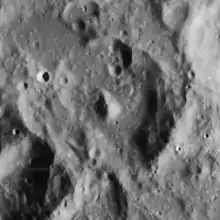Faye (crater)
Faye is a heavily eroded lunar impact crater in the rugged southern highlands of the Moon. It is named after French astronomer Hervé Faye.[1] It is attached to the northeastern rim of the crater Delaunay, with Donati located just a few kilometers to the northeast. It forms part of a chain of craters of increasing size to the southwest that continues with La Caille and ends with the walled plain Purbach.
 Lunar Orbiter 4 image | |
| Coordinates | 21.4°S 3.9°E |
|---|---|
| Diameter | 36 km |
| Depth | 2.4 km |
| Colongitude | 357° at sunrise |
| Eponym | Hervé Faye |
The rim of Faye is heavily damaged, particularly along the western half and covers much of the southwestern interior floor. The rim is nearly non-existent in the northwest, where a gap joins the interior with the surrounding terrain. The surviving interior floor is relatively featureless, with a central peak rising at the midpoint. There is a small craterlet and the incised remnant of a small crater rim in the northeast part of the floor.
Satellite craters
By convention these features are identified on lunar maps by placing the letter on the side of the crater midpoint that is closest to Faye.
| Faye | Latitude | Longitude | Diameter |
|---|---|---|---|
| A | 21.2° S | 3.1° E | 4 km |
| B | 22.6° S | 4.5° E | 4 km |
References
- "Faye (crater)". Gazetteer of Planetary Nomenclature. USGS Astrogeology Research Program.
- Andersson, L. E.; Whitaker, E. A. (1982). NASA Catalogue of Lunar Nomenclature. NASA RP-1097.CS1 maint: ref=harv (link)
- Bussey, B.; Spudis, P. (2004). The Clementine Atlas of the Moon. New York: Cambridge University Press. ISBN 978-0-521-81528-4.CS1 maint: ref=harv (link)
- Cocks, Elijah E.; Cocks, Josiah C. (1995). Who's Who on the Moon: A Biographical Dictionary of Lunar Nomenclature. Tudor Publishers. ISBN 978-0-936389-27-1.CS1 maint: ref=harv (link)
- McDowell, Jonathan (July 15, 2007). "Lunar Nomenclature". Jonathan's Space Report. Retrieved 2007-10-24.CS1 maint: ref=harv (link)
- Menzel, D. H.; Minnaert, M.; Levin, B.; Dollfus, A.; Bell, B. (1971). "Report on Lunar Nomenclature by the Working Group of Commission 17 of the IAU". Space Science Reviews. 12 (2): 136–186. Bibcode:1971SSRv...12..136M. doi:10.1007/BF00171763.
- Moore, Patrick (2001). On the Moon. Sterling Publishing Co. ISBN 978-0-304-35469-6.CS1 maint: ref=harv (link)
- Price, Fred W. (1988). The Moon Observer's Handbook. Cambridge University Press. ISBN 978-0-521-33500-3.CS1 maint: ref=harv (link)
- Rükl, Antonín (1990). Atlas of the Moon. Kalmbach Books. ISBN 978-0-913135-17-4.CS1 maint: ref=harv (link)
- Webb, Rev. T. W. (1962). Celestial Objects for Common Telescopes (6th revised ed.). Dover. ISBN 978-0-486-20917-3.CS1 maint: ref=harv (link)
- Whitaker, Ewen A. (1999). Mapping and Naming the Moon. Cambridge University Press. ISBN 978-0-521-62248-6.CS1 maint: ref=harv (link)
- Wlasuk, Peter T. (2000). Observing the Moon. Springer. ISBN 978-1-85233-193-1.CS1 maint: ref=harv (link)
